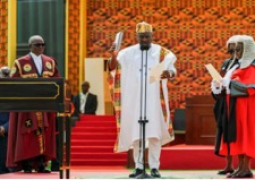
The funding will allow PACD to extend electrification to 7 additional villages in the North Bank Region, namely Medina Serigne Mass, Berending, Ndungu Kebbeh, Buniadou, Albreda and Kuntaya.
Electricity coverage in The Gambia is estimated at 35 percent of the urban population and 6 percent of the rural population. Only 10% of villages in the North Bank Region are electrified as of 2019.
“The expansion of electricity in the rural areas will enable us to enhance our contribution to The Gambia’s sustainable development path. Together with partners, we will better meet the targets in the electricity roadmap of the country,” highlighted Alieu Loum, National Coordinator Programme for Accelerated Development (PACD) and Director General of the Department for Strategic Policy & Delivery, Ministry of Public Service, Office of The President
Under the PACD electricity component, ten (10) communities in Lower Nuimi, Upper Nuimi and Jokadu districts of North Bank Region have been supplied with electricity. 96 SMEs have also benefitted as well as 32 public utilities.
Overall, 69 additional electrical poles have been installed in North Bank Region since the start of the PACD project in 2021. As of September 2022, 478 Households and 3,824 people had access to electricity in the North Bank Region.
Provision of electricity to the seven identified communities in the North Bank Region will help to bridge the uneven access to electricity, enhance the economic opportunities of the population in these areas and improve their social wellbeing thereby assisting in the reduction of poverty in the country.
“To accelerate the achievement of the 2030 Agenda, there is urgent need to scale-up in dynamic, innovative partnerships for The Gambia’s development,” said Aissata De, UNDP Resident Representative of The Gambia. “The Programme for Accelerated Community Development sets actions beyond temporary solutions. By bridging the divide between rural and urban areas, PACD will contribute to significant improvement of the living conditions of people in the rural areas through improving sustainable access to basic socio-economic infrastructure and services, which will support more sustainable development in The Gambia.”





